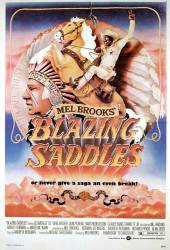Revealing mistake: When Mongo wakes up and breaks free of the chains, in the shot where he breaks free, the chains suddenly shift position and some even disappear. This is because the camera was stopped and the chains were replaced with fake break always before the camera was restarted. Another way to see this is because the water that dripping down Mongo's face suddenly stops. (01:02:15)
Revealing mistake: As Mongo enters the bar, you can tell the background is a piece of scenery just outside the entrance; there is a wrinkle in the fabric at the floor.
Revealing mistake: After Bart's announcement, the preacher holds up a bible. As he does, you can see that it doesn't move like a bible that size might. Plus, after the hole is "shot", the cover splinters from the pyrotechnic charge goes off, showing it's a wooden prop.
Revealing mistake: Just before Mongo punches the horse, the rider's hands inch up on the rein. As Mongo swings, the rider jerks the rein, pulling the horse's head around as Mongo's fist approaches the horse's head.
Revealing mistake: As Bart grabs the black king, watch his hands. He claps his hands around the king, draws the toward his body, and they dip partially down below the level of the table. When he does that, he opens his hands just enough to allow the piece to fall out of the camera's range. Then Jim pulls out a duplicate piece he had in his holster.






Chosen answer: The opening line of the song refers to the Camptown Ladies and the phrase "Camptown Races" never appears anywhere in the lyrics. If nobody told him otherwise, Lyle may simply have assumed that some variation on "Camptown Ladies" was the actual title.
Tailkinker ★
The actual title of the song was "Gwine to Run All Night, or De Camptown Races," written by American lyricist Stephen Foster and first published in 1850. Over many years on the minstrel show circuit, the title was shortened to "Camptown Races" and was sometimes erroneously called "Camptown Ladies." While the phrase "Camptown Races" doesn't appear in the lyrics, the phrase "Camptown Racetrack" does appear in the second line: "Camptown ladies sing dis song, doo-dah, doo-dah, Camptown Racetrack five miles long, oh-de-doo-dah-day." The song refers to Camptown, Pennsylvania, a real town with a popular horserace in the mid-1800s.
Charles Austin Miller